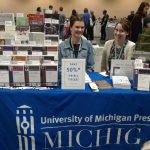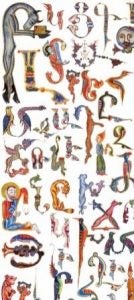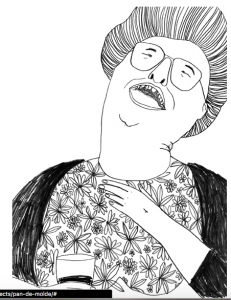In anticipation of our 2021-22 Mellon Sawyer Seminar on “Sites of Translation in the Multilingual Midwest,” we are proud to highlight members of our own translation community.
For our first interview in this series, we had the chance to talk with Kelsey Trotta, a University of Michigan graduate and full-time freelance translator. Kelsey’s prior work includes translating interviews for The New York Times, subtitles for National Geographic docu-series, training videos for multinational corporations, USAID interviews, United Nations documents, legal, medical, and technical documents, vital records, as well as interpretation for asylum seekers. You can find more information about her work here.
*
Meg Berkobien: When did you first become aware of translation as a process or a concept?
Kelsey Trotta: Well, I suppose this is more a memory of interpretation than translation per se, but when I was 12 or 13 years old, I was watching a newswoman reporting in English from abroad. When someone approached her, she said something in Arabic or Dari, then she went right back to her report. I didn’t know much about code switching until college, but at the time I remember thinking, Ok, that’s what I want to do.
MB: What about that exchange felt so vital to you?
KT: I think it was the fact that she transitioned so smoothly from one language to another. I grew up in a monolingual household so I’d never seen anything like that before.
MB: I know you translate from Spanish, French, and Portuguese. Which language did you learn first? How did you go about learning each of them?
KT: I started with Spanish. I remember telling my parents that I wanted to study French and they said to start with Spanish and move into French in high school. So I did. And then when I was in college, I took an Italian class because my grandparents speak Italian, and then I learned Portuguese. After college, I decided to apply to teach English in Brazil for a year. And what really kind of did it for me was being able to be fully immersed in the culture there because very few people spoke English. Most non-Brazilian people were from different parts of Latin America, so I got a lot of great experience with folks speaking different dialects of Spanish and Portuguese and really learning how to communicate in a language that wasn’t my own beyond theory.
MB: Yeah, I mean, it’s such a powerful thing, not having that English crutch.
KT: You fall into learning the hard way. And that can be fun—it’s kind of like learning how to ride a bike. You’ve just got to get back on if you’ve fallen down.
MB: When did you start getting curious about translation as a field of study? In undergrad?
KT: Yes, I would say I had a few different classes that were particularly impactful. Translation as a full-time job kind of fell into my lap, but I started being interested in translation probably around my junior year of college. I had a couple of classes, one, for instance, with Professor Christi Merrill, called “The Truth Claims of Indian Literature,” where we spoke about rendering certain concepts untranslatable and not having them conform to European ideals, which was beyond fascinating. There was also another with Professor Catherine Brown on Don Juan where we discussed untranslatable concepts, specifically untranslatable words. I also took a class with Professor Teresa Satterfield that really helped me break down sentences, and I didn’t realize it at the time, but learning to do that was indispensable to translation because it’s what I do literally every day.
MB: I know you focused on Latin American literature in college. Did you also study a specific national literature?
KT: Not exclusively. I definitely read Borges, Cortázar, García Márquez. But I don’t think I was really able to fully appreciate the beauty of Latin American literature until I went there. Once I went, though, everything just kind of fell into place.
MB: Where did you go?
KT: After living in Brazil I travelled to Argentina, Peru, and Colombia. I only got to spend one night in Uruguay.
MB: Ah, Uruguay! The author I primarily translate, Cristina Peri Rossi, is Uruguayan. Which leads me to another question—do you do any literary translation, by chance?
KT: To be honest, it’s not my strong suit, so I’m more on the translating content and technical side of things. But I really have so much respect for literary translators because that’s a whole other level of getting into the author’s head. It’s like looking through a kaleidoscope and describing it clearly, and I have so much respect for it as an art and profession.
MB: Did you do translation in any community capacity while you were in undergrad?
KT: I translated a bit to make money during college, but it wasn’t until after graduation that I started working in the community.
MB: Ah, I ask because I know you’re connected to the Language Resource Center here at the University. They love your work. And they’ve been doing the Translate-a-thon here at the University for a while now, and I was wondering if you had participated in that.
KT: Oh! Yes, I participated in that a year and a half ago.
MB: So after you graduated. You came back!
KT: It was really cool to be able to do it, because it felt like an honor to be back and help other people. The person we were translating on behalf of was a Mexican journalist, Emilio Guttiérez, who was fighting the good fight and letting people know about what was going on. He has been seeking asylum for the past ten years.
MB: Can you say a bit more about that project?
KT: The project was to translate Guttiérez’s newspaper articles. He was exposing human rights abuses and being threatened for it, which is why he crossed the border to seek asylum. Michigan’s Language Resource Center took up his cause and made translating his work the focus of the 2018 Translate-a-Thon. I was very lucky because I’ve worked with a fair amount of asylum cases, so I had translated similar things before. It felt great to be able to do that for someone, especially someone who was fighting the good fight.
MB: Exactly. And I think that’s important because when you’re a freelance translator, you don’t always get to take on that kind of work. Often, the people who often pay best are businesses.
KT: I’ve been very lucky in terms of clients. I’ve been able to make a living without working with companies I disagree with, those committing human rights abuses or whose practices go against what I believe and that I’d have to go against my conscience to work for…
MB: That’s honestly so great to hear. I guess this would make a good pivot point–what do you translate in your day-to-day?
KT: Half of my work is translating legal documents, vital records, and technical translations. I do a lot of work for immigration law firms. And I do a lot of work for different companies that work with Latin America and Europe. And then a big part of my work and also what’s called localization. Localization is basically where you translate copy and then you tailor it to a local market in a way that the content will appeal to a local consumer. I really love it. Occasionally, I’ll get academic journal articles and technical documents but my bread and butter are localization and legal documents.
MB: So what kinds of technology do you utilize? What makes the difficult work of translating easier?
KT: Lots and lots and lots of dictionaries. The WordReference forum is one that every professor I’ve ever had recommends, and I use it every day. Linguee is another good one. And if I’m really, really stuck on something, I’ll go to the DRAE (Spanish), the Priberam (Portuguese), or the Larousse (French).
MB: Ah, I use all of those online resources, too! I don’t have any physical dictionaries around anymore. I just keep asking myself–what happens if the Internet goes down? Will I still be a translator? (Laughs.)
KT: I have at least two or three dictionaries on my phone, too!
MB: Have the classes you took at Michigan had any bearing on your professional work?
KT: Oh, they definitely have. Like I said, I had a lot of great professors there, I can’t speak highly enough of them. The biggest thing that I took away was the ability to break a sentence down, work with the different meanings it contains, and doing a close reading of the source content in order to convey the message I want to convey.
I mean, I remember when I was working on my first asylum case and the person was granted asylum. I contacted a couple of my professors and just said, “Hey, I just wanted to let you know that your classes were really instrumental to my growth. I’m a full-time translator now and my client just won the asylum case I was working on. So, thank you.”
MB: What a feeling! I’m just thinking kind of back to what you said about the untranslatable—how does that work in a professional context? I mean, I don’t think that clients will tend to want you to keep things untranslated. I know that’s a bit of a high theory kind of thing, in the realm of literary translation maybe, but do you see the untranslatable at work in your asylum cases?
KT: Sometimes concepts don’t translate well. Usually when I encounter those types of concepts, I’ll ask if I’m allowed to adjust the content accordingly. This could be finding an equivalent situation, or finding a different way to explain something. I think it’s really important when translating, to know, understand, and respect your audience, because that’s primarily what we’re doing when we’re translating. Part of that obviously has to do with the word, but another part of it conveying the sense of the message in terms your audience will understand and respond to.
MB: Do you work pretty closely with lawyers or paralegals?
KT: I do. I work with a few different immigration law firms. Sometimes I do tricky things like articles of incorporation or business agreements, or MOUs (memoranda of understanding). I work with a fair amount of lawyers on various projects.
MB: So, I know that you can’t talk about any cases in particular, but, in general, has that work led you to do any community organizing around immigration outside of your translation work?
KT: Most of the work I do surrounding questions of immigration is my translation work. And I’m all for writing to local politicians to make sure they’re aware of what’s happening in our area. I’ll also post on my personal social media about orgs working on immigrant rights, why immigrants are so important in our communities, and how people can help. And I try to stay very aware of what’s going on by listening to different news outlets in the US and abroad.
MB: Exactly. That’s such an important aspect of our work, I think, because part of being a translator is being an advocate.
KT: Agreed. The way I see it, I’ve been lucky enough to be invited into these communities through language, and because of that, I want to use my platform in any way I can to pass the microphone so to speak and raise awareness about the issues that many are facing.
MB: What is your dream project?
KT: I wouldn’t say I have just one. I’ve localized content for hotel chains, and I absolutely love doing that. I worked in hospitality for a while after college, and I was a tour guide in Rio during the World Cup. I love being able to tell people about different places and different ways to travel, places to go and what to eat, etc. What was really cool about those particular projects was that I was able to learn more about my own country. I would love to be able to do more work translating in different areas of hospitality.
I would also love to translate food-related texts. In my spare time, I love baking and so I’ll go to popular foreign-language websites and translate recipes. I would love to be able to translate a cookbook or a book on the history of food and colonization’s impact on food systems that shape how we eat today.
I guess the last project would be translating a documentary about visiting different bakeries around the world, tracing the history of bakeries and different baked goods. For example, the history of different pastry work is fascinating; I’d love to learn more about how certain forms came to be and the impact that monasticism has had on it.
MB: I’m pretty sure everyone who subscribes to Netflix would watch that.
KT: I hope so! I’d love to do something similar to Samin Nosrat’s Salt Fat Acid Heat but for baking.
MB: So, I was hoping we might end with the question of the untranslatable. What’s your favorite untranslatable word?
KT: Ah, that’s like asking me to name my favorite language or favorite book. In Spanish, I guess I would say “engañar” or “burlar.” Because this idea of an intentional and artful deception is something that we don’t really have in English. And it is an important concept because it informs certain ways of communication that I think to a certain extent, the English language is limited by. In Brazilian Portugese there’s the word “malandro,” which as a term is common throughout Brazil and can mean something to the effect of being savvy and sometimes untrustworthy, but the “malandro” archetype and the concept of “malandragem” are unique to Rio de Janeiro and “carioca” (from Rio de Janeiro) culture. Plus, there’s the subjective—it’s one of the coolest tenses in my opinion.
MB: Well, thank you so much, Kelsey, for sharing your story with us. I know I’m proud to be in community with past grads and translators like you.
KT: Thank you!














